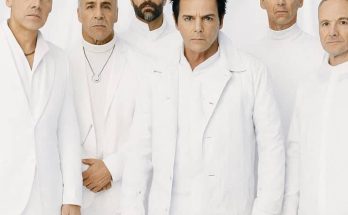The world stood still for a few seconds, then erupted into chaos as BTS, the global phenomenon that redefined pop music, shocked millions of fans with the announcement of their long-awaited 2026 world tour, tentatively dubbed “Eclipse.” It wasn’t just another concert reveal—it was a resurrection. After years apart, with each member completing mandatory military service and exploring solo projects, the seven men who once commanded stadiums, charts, and hearts finally stood together again. The news broke during a Weverse live stream on July 1, 2025, when RM, the group’s leader, casually yet powerfully confirmed what the world had been yearning to hear: “Starting July, we’ll be near each other more and work on our album. Our group album is officially set to be released next spring.” The words hit like lightning. The livestream, which began as a casual check-in, became historic. Millions watched as RM, Jin, SUGA, j-hope, Jimin, V, and Jungkook laughed, reminisced, and teased what was coming next. It was the first time in nearly three years that all seven appeared together publicly, and their chemistry was as effortless as ever. Then came the bombshell—after the spring album, BTS would embark on a full world tour. It was the confirmation that the ARMY had been holding their breath for since 2022.
The group had been on hiatus as members fulfilled their national service obligations, leaving a void in the global music scene that no one quite managed to fill. Their last group performance, “Yet to Come in Busan,” had been both a farewell and a promise. Now, that promise was being kept. The comeback, slated for spring 2026, represents not just a musical return but a cultural reset. Each member has grown, experimented, and expanded his artistry during the hiatus—RM delved into introspective rap and art collaborations, Jimin explored dance-driven emotional pop, V pursued jazz-tinged crooning, SUGA built a bridge between hip-hop and vulnerability, j-hope channeled raw energy into his solo projects, Jin revealed his warmth and humor through military updates, and Jungkook conquered global charts with his solo hits. Now, all those individual experiences are set to merge again under one monumental project.
The rumored name “Eclipse” has spread like wildfire online, though HYBE has yet to officially confirm it. Fans found meaning in the symbolism: an eclipse represents the temporary darkening of one light as another takes its place, only for the full brilliance to return once the shadow passes. To many ARMYs, the military hiatus was that shadow, and the upcoming tour marks the reemergence of light—BTS shining once again as a complete seven-member constellation. Social media exploded within minutes of the livestream. On X (formerly Twitter), the hashtag #BTSEclipse2026 trended globally, with fans sharing edited posters, countdown clocks, and emotional reaction videos. On Reddit and TikTok, theories proliferated about the album’s concept, possible tour locations, and setlists. One fan wrote, “This feels unreal. We waited through enlistments, solo eras, uncertainty—and now, we finally get to see them together again. Eclipse isn’t just a tour; it’s the reunion of our generation.”
The emotional weight of this comeback can’t be overstated. BTS’s influence reaches far beyond the borders of South Korea. They’re cultural ambassadors, fashion icons, philanthropists, and trailblazers in bridging East and West through art. Their impact on the global economy and South Korea’s soft power is well documented, with analysts once estimating their contribution to the Korean GDP at billions annually. A new tour, therefore, isn’t just about music—it’s about revitalizing an ecosystem of fandom, media, tourism, and culture that thrives around their movement. Economists and entertainment experts alike predict that “Eclipse” could easily surpass their previous “Love Yourself” and “Permission to Dance” tours in scale, attendance, and revenue. With the pent-up anticipation of nearly four years, tickets will likely sell out within minutes once they drop.
The 2026 album will be their first major group project since the 2022 anthology “Proof.” RM hinted during the livestream that the members plan to work closely together in Los Angeles beginning mid-2025, combining their creative processes and ideas. “We’ll live together, have fun together, and work together,” he said, smiling as his bandmates nodded. The statement reignited nostalgia among fans who remembered the days of BTS’s early dorm life, their laughter echoing through cramped rooms as they built their empire. Now, they return not as rookies chasing dreams but as global legends shaping legacies. Each member’s solo success will now feed into the group dynamic, potentially creating a body of work that’s richer, more mature, and deeply introspective.
While official details remain scarce, the music industry is already bracing for impact. Insiders suggest that the “Eclipse” concept may embrace themes of light, renewal, and unity, reflecting BTS’s journey through darkness and back. Some speculate that the album’s sound could blend the introspective tone of their solo projects with the grand, anthemic scale of their group hits. The members have often spoken about evolving beyond pop labels, seeking authenticity over formulas. Fans are expecting music that challenges conventions—a sonic experience that represents who they are now as thirty-something artists navigating fame, growth, and identity.
As for the tour itself, sources close to HYBE have hinted at a multi-continent itinerary spanning at least six months. Expected regions include Asia, North America, Europe, and South America, with potential shows in the Middle East and Australia. African ARMYs are already campaigning online for a concert stop on the continent, trending hashtags like #BTSAfrica2026. Though BTS has yet to perform in Africa, fans in countries like Nigeria, South Africa, and Kenya are hopeful this era might finally change that. Whether or not it happens, fanbases across Africa are already planning communal watch parties for livestreamed shows. For many, even a digital connection to the event would be monumental.
What makes this comeback especially emotional is how BTS have remained tethered to their fans throughout their hiatus. Through Weverse messages, letters, and the occasional social-media post, they reminded ARMY that their bond was intact. When Jin, the eldest, enlisted first in December 2022, he promised, “We’ll meet again soon.” Three years later, that promise is being fulfilled. The group’s unity—rare in a music industry often defined by individualism—stands as one of their defining features. Fans have always said that BTS’s magic lies not only in their music but in the genuine friendship and brotherhood that radiates from them. Their reunion validates that belief once again.
The fandom’s reaction has been nothing short of euphoric. Some ARMYs describe the news as “healing,” a symbolic closure to the long, uncertain chapter that began in 2022. Artists and celebrities across the world have joined the celebration; even non-K-pop figures like American producers and European DJs have posted cryptic messages hinting at possible collaborations. The entertainment world knows that when BTS moves, the earth trembles a little. Brands are already strategizing partnerships, knowing that a BTS world tour means millions of eyes and billions of impressions. Cities, too, are preparing; during past tours, local tourism boomed wherever BTS performed, with restaurants, hotels, and shops seeing massive spikes in visitors. The 2026 tour is expected to have an even greater ripple effect.
What makes the “Eclipse” moment even more profound is its timing. The world has changed drastically since BTS last stood on stage together. Post-pandemic realities, shifting digital landscapes, and the maturing of global fandoms have transformed how music is consumed and experienced. BTS have always been ahead of the curve—integrating technology, storytelling, and emotion into everything they do. Fans speculate that the “Eclipse” tour might incorporate cutting-edge elements such as augmented-reality visuals, AI-generated stage backdrops, and immersive audience experiences. Knowing BTS’s penchant for innovation, that’s not far-fetched. Their 2022 “Permission to Dance” concerts already demonstrated their ability to merge digital and physical worlds seamlessly.
Beyond spectacle, however, lies something more intimate. This comeback is deeply personal, both for BTS and their fans. Each member endured years of separation, self-discovery, and waiting. Each fan weathered that waiting, holding onto memories and hope. When Jin, the first to finish military service, appeared at j-hope’s discharge, fans wept at the image of them reuniting. Multiply that by seven, and you have the emotional force behind “Eclipse.” The name may be unofficial, but its symbolism fits perfectly—the light of BTS never vanished; it was merely hidden, waiting to blaze again.
Though the internet is ablaze with speculation, HYBE has yet to release concrete details like dates, venues, or the official tour name. Some reports suggest announcements will roll out gradually, with teaser trailers and visual concepts dropping early in 2026. Fans are already setting aside savings, updating passports, and planning viewing parties for the album launch. Others are creating fan art and community projects to celebrate the return. The sense of unity and purpose among ARMY is as strong as ever; it feels like the early days of fandom, yet elevated by maturity and gratitude. For many, this isn’t just a comeback—it’s the culmination of patience, loyalty, and love.
Music journalists are already predicting that the new album will dominate global charts, given BTS’s track record. Even during their hiatus, individual members topped Billboard rankings and Spotify charts. Now, united, their collective power could reshape the 2026 musical landscape. Industry experts also note that their timing is strategic: spring 2026 offers space between major Western artist tours, giving BTS a clear runway to dominate the global conversation. It’s expected that their lead single will premiere during a high-profile event, possibly an award show or live broadcast, setting off a wave of nostalgia and renewed interest in K-pop worldwide.
The idea of the “Eclipse” tour isn’t just poetic—it’s cinematic. Fans imagine dark-to-light stage transitions, celestial imagery, and interludes reflecting the passage of time. They picture seven silhouettes emerging through beams of light, symbolizing reunion. Whether that vision aligns with reality remains to be seen, but one thing is certain: BTS’s storytelling prowess will make this era unforgettable. Their artistry has always intertwined music, visuals, and emotion, and with years of reflection behind them, this next chapter could be their most profound yet.
As fans worldwide count down to 2026, excitement continues to build. It’s not just about seeing BTS perform again—it’s about witnessing history, about closure and rebirth. From Seoul to São Paulo, London to Lagos, the anticipation transcends language and geography. BTS once said that their music was meant to “speak to those who have loved, lost, and dreamed.” After years of silence as a group, they are ready to speak again, louder than ever. The world, waiting patiently in the dark, now looks toward the horizon where seven lights will soon rise once more. Whether or not the tour is officially called “Eclipse,” the meaning stands. The darkness has passed. The stage is ready. BTS is coming home, and the world is already holding its breath.



